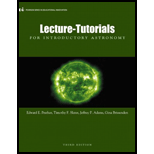
Consider the following discussion between two students about the cause of the seasons.
Student 1:I get it. So since Earth is tilted, there are times when the northern part of Earth is closer to the Sun than the southern part. So the north has summer and the south has winter. And then later, the south is tilted toward the Sun and gets closer and has summer.
Student 2:I disagree. Although the tilt does bring one hemisphere closer to the Sun, the difference in distance between the northern half and southern half of Earth is really small compared to how far away Earth is from the Sun.
Do you agree or disagree with either or both of the students? Explain your reasoning.
Learn your wayIncludes step-by-step video

Chapter 4 Solutions
Lecture- Tutorials for Introductory Astronomy
Additional Science Textbook Solutions
Applications and Investigations in Earth Science (9th Edition)
Chemistry: The Central Science (14th Edition)
Biology: Life on Earth (11th Edition)
Anatomy & Physiology (6th Edition)
Campbell Biology (11th Edition)
Human Biology: Concepts and Current Issues (8th Edition)
- Truck suspensions often have "helper springs" that engage at high loads. One such arrangement is a leaf spring with a helper coil spring mounted on the axle, as shown in the figure below. When the main leaf spring is compressed by distance yo, the helper spring engages and then helps to support any additional load. Suppose the leaf spring constant is 5.05 × 105 N/m, the helper spring constant is 3.50 × 105 N/m, and y = 0.500 m. Truck body yo Main leaf spring -"Helper" spring Axle (a) What is the compression of the leaf spring for a load of 6.00 × 105 N? Your response differs from the correct answer by more than 10%. Double check your calculations. m (b) How much work is done in compressing the springs? ☑ Your response differs significantly from the correct answer. Rework your solution from the beginning and check each step carefully. Jarrow_forwardA spring is attached to an inclined plane as shown in the figure. A block of mass m = 2.71 kg is placed on the incline at a distance d = 0.285 m along the incline from the end of the spring. The block is given a quick shove and moves down the incline with an initial speed v = 0.750 m/s. The incline angle is = 20.0°, the spring constant is k = 505 N/m, and we can assume the surface is frictionless. By what distance (in m) is the spring compressed when the block momentarily comes to rest? m m 0 k wwwwarrow_forwardA block of mass m = 2.50 kg situated on an incline at an angle of k=100 N/m www 50.0° is connected to a spring of negligible mass having a spring constant of 100 N/m (Fig. P8.54). The pulley and incline are frictionless. The block is released from rest with the spring initially unstretched. Ө m i (a) How far does it move down the frictionless incline before coming to rest? m (b) What is its acceleration at its lowest point? Magnitude m/s² Direction O up the incline down the inclinearrow_forward
- (a) A 15.0 kg block is released from rest at point A in the figure below. The track is frictionless except for the portion between points B and C, which has a length of 6.00 m. The block travels down the track, hits a spring of force constant 2,100 N/m, and compresses the spring 0.250 m from its equilibrium position before coming to rest momentarily. Determine the coefficient of kinetic friction between the block and the rough surface between points B and C. -A 3.00 m B C -6.00 m i (b) What If? The spring now expands, forcing the block back to the left. Does the block reach point B? Yes No If the block does reach point B, how far up the curved portion of the track does it reach, and if it does not, how far short of point B does the block come to a stop? (Enter your answer in m.) marrow_forwardA ball of mass m = 1.95 kg is released from rest at a height h = 57.0 cm above a light vertical spring of force constant k as in Figure [a] shown below. The ball strikes the top of the spring and compresses it a distance d = 7.80 cm as in Figure [b] shown below. Neglecting any energy losses during the collision, find the following. т m a d T m b i (a) Find the speed of the ball just as it touches the spring. 3.34 m/s (b) Find the force constant of the spring. Your response differs from the correct answer by more than 10%. Double check your calculations. kN/marrow_forwardI need help with questions 1-10 on my solubility curve practice sheet. I tried to my best ability on the answers, however, i believe they are wrong and I would like to know which ones a wrong and just need help figuring it out.arrow_forward
- Question: For a liquid with typical values a = 10-3K-¹ K = 10-4 bar-1 V=50 cm³ mol-1, Cp 200 J mol-1K-1, calculate the following quantities at 300 K and 1 bar for one mole of gas: 1. () P ән 2. (9) T 3. (V) T 4. (1) P 5. (9) T 6. Cv 7. (OF)Tarrow_forwardA,B,C AND Darrow_forwardA bungee jumper plans to bungee jump from a bridge 64.0 m above the ground. He plans to use a uniform elastic cord, tied to a harness around his body, to stop his fall at a point 6.00 m above the water. Model his body as a particle and the cord as having negligible mass and obeying Hooke's law. In a preliminary test he finds that when hanging at rest from a 5.00 m length of the cord, his body weight stretches it by 1.55 m. He will drop from rest at the point where the top end of a longer section of the cord is attached to the bridge. (a) What length of cord should he use? Use subscripts 1 and 2 respectively to represent the 5.00 m test length and the actual jump length. Use Hooke's law F = KAL and the fact that the change in length AL for a given force is proportional the length L (AL = CL), to determine the force constant for the test case and for the jump case. Use conservation of mechanical energy to determine the length of the rope. m (b) What maximum acceleration will he…arrow_forward
- 210. Sometimes the Helmholtz free energy F(T, V, N) divided by temperature, T, is an interesting quantity. For example, the quantity is proportional to the logarithm of the equilibrium constant or solubilities. A. Derive a relationship showing that Find the constant of proportionality. a F αυ ƏT T B. Suppose F(T) depends on temperature in the following way: F(T)=2aT²+bT. Find S(T) and U(T).arrow_forwardchoosing East (e) is not correct!arrow_forwarddisks have planes that are parallel and centered Three polarizing On a common axis. The direction of the transmission axis Colish dashed line) in each case is shown relative to the common vertical direction. A polarized beam of light (with its axis of polarization parallel to the horizontal reference direction) is incident from the left on the first disk with int intensity So = 790 W/m². Calculate the transmitted intensity if 81=28.0° O2-35.0°, and O3 = 40.0° w/m² horizontal Өз 02arrow_forward
 AstronomyPhysicsISBN:9781938168284Author:Andrew Fraknoi; David Morrison; Sidney C. WolffPublisher:OpenStax
AstronomyPhysicsISBN:9781938168284Author:Andrew Fraknoi; David Morrison; Sidney C. WolffPublisher:OpenStax Foundations of Astronomy (MindTap Course List)PhysicsISBN:9781337399920Author:Michael A. Seeds, Dana BackmanPublisher:Cengage Learning
Foundations of Astronomy (MindTap Course List)PhysicsISBN:9781337399920Author:Michael A. Seeds, Dana BackmanPublisher:Cengage Learning Stars and Galaxies (MindTap Course List)PhysicsISBN:9781337399944Author:Michael A. SeedsPublisher:Cengage Learning
Stars and Galaxies (MindTap Course List)PhysicsISBN:9781337399944Author:Michael A. SeedsPublisher:Cengage Learning
 Stars and GalaxiesPhysicsISBN:9781305120785Author:Michael A. Seeds, Dana BackmanPublisher:Cengage Learning
Stars and GalaxiesPhysicsISBN:9781305120785Author:Michael A. Seeds, Dana BackmanPublisher:Cengage Learning An Introduction to Physical SciencePhysicsISBN:9781305079137Author:James Shipman, Jerry D. Wilson, Charles A. Higgins, Omar TorresPublisher:Cengage Learning
An Introduction to Physical SciencePhysicsISBN:9781305079137Author:James Shipman, Jerry D. Wilson, Charles A. Higgins, Omar TorresPublisher:Cengage Learning





